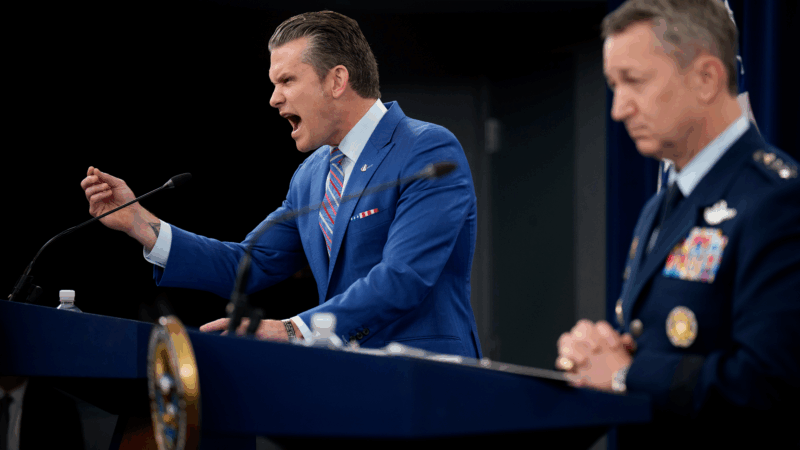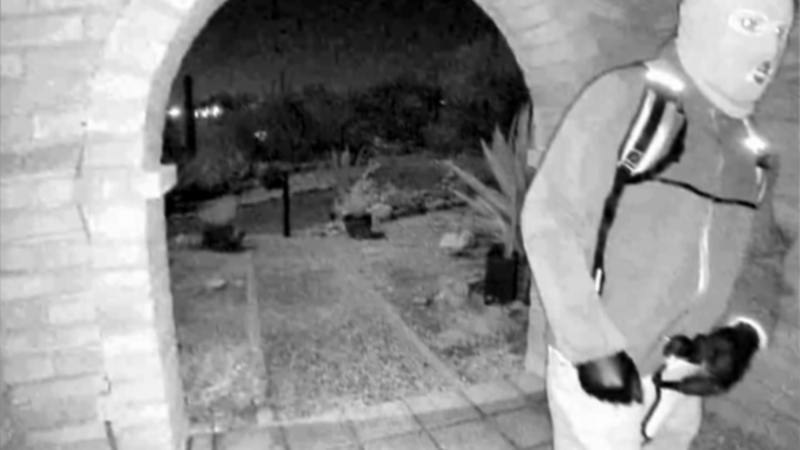Pentagon chief: Iran strike was a ‘historically successful attack’
Striking a combative tone, Defense Secretary Pete Hegseth lambasted the media, saying it was more focused on “cheering against” President Trump than covering a “historically successful attack” on Iranian nuclear sites.
“President Trump directed the most complex and secretive military operation in history,” Hegseth declared at a Pentagon news conference. “It was a resounding success resulting in a ceasefire agreement” in the war involving Iran, Israel and the U.S.
He condemned the leak of a preliminary report from the Defense Intelligence Agency, which U.S. officials, speaking on condition of anonymity, shared Tuesday with news organizations, including NPR.
The report, based on information just a day-and-a-half after the U.S. attack, described the damage as “limited” and said the strike may have set back the Iranian nuclear program by just a matter of months. Hegseth said the document noted this was a “preliminary, low-confidence report that will continue to be refined.”
Trump has responded angrily to the media stories citing that report and has claimed repeatedly that the Iranian program was “totally obliterated.”
Trump has not cited evidence for this claim, but Hegseth and other top administration officials have stepped in to back the president.
“President Trump created the conditions to end the war. Decimating, choose your word, obliterating, destroying, Iran’s nuclear capabilities,” Hegseth said.
CIA Director John Ratcliffe issued a statement Wednesday saying Iran’s nuclear program has been “severely damaged” and any attempt to rebuild it would have to be done “over the course of years.” The CIA rarely issues public statements on such sensitive matters.
Director of National Intelligence Tulsi Gabbard said on X that “Iran’s nuclear facilities have been destroyed. If the Iranians chose to rebuild, they would have to rebuild all three facilities (Natanz, Fordow, Esfahan) entirely.”
Hegseth repeatedly criticized the media, citing a number of news organizations and reporters by name, for what he called “a great deal of irresponsible reporting.”
Standing next to Hegseth at the Pentagon briefing, the chairman of the Joint Chiefs of Staff, Gen. Dan Caine, stuck a more reserved tone.
He recounted a U.S. effort, dating back more than 15 years, to develop and test the weapon that went into U.S. strike in Iran, which named Operation Midnight Hammer.
Gen. Caine said the strikes by the B-2 Stealth Bombers, which dropped 14 bunker-busting bombs on Iran, went exactly according to plan.
He said it was not his role to perform a battle damage assessment, noting this is the responsibility of the various U.S. intelligence agencies.
“We don’t grade our own homework,” Caine said.
Malinowski concedes to Mejia in Democratic House special primary in New Jersey
With the race still too close to call, former congressman Tom Malinowski conceded to challenger Analilia Mejia in a Democratic primary to replace the seat vacated by New Jersey Gov. Mikie Sherrill.
FBI release photos and video of potential suspect in Guthrie disappearance
An armed, masked subject was caught on Nancy Guthrie's front doorbell camera one the morning she disappeared.
Reporter’s notebook: A Dutch speedskater and a U.S. influencer walk into a bar …
NPR's Rachel Treisman took a pause from watching figure skaters break records to see speed skaters break records. Plus, the surreal experience of watching backflip artist Ilia Malinin.
In Beirut, Lebanon’s cats of war find peace on university campus
The American University of Beirut has long been a haven for cats abandoned in times if war or crisis, but in recent years the feline population has grown dramatically.
Judge rules 7-foot center Charles Bediako is no longer eligible to play for Alabama
Bediako was playing under a temporary restraining order that allowed the former NBA G League player to join Alabama in the middle of the season despite questions regarding his collegiate eligibility.
American Ben Ogden wins silver, breaking 50 year medal drought for U.S. men’s cross-country skiing
Ben Ogden of Vermont skied powerfully, finishing just behind Johannes Hoesflot Klaebo of Norway. It was the first Olympic medal for a U.S. men's cross-country skier since 1976.







